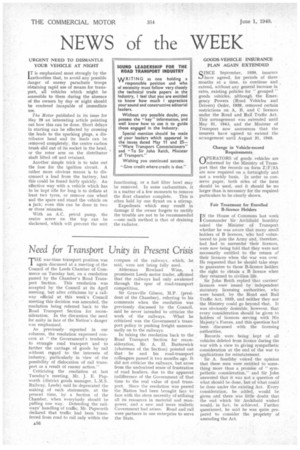Need for Transport
Page 18

If you've noticed an error in this article please click here to report it so we can fix it.
Unity in Present Crisis
THE war-time transport position was again discussed at a meeting of the Council of the Leeds Chamber of Commerce on Tuesday last, on a resolution passed by the Chamber's Road Transport Section. This resolution was accepted by the Council at its April meeting, but after criticisms by a railway official at this week's Council meeting this decision was amended, the resolution being referred back to the Road Transport Section for reconsideration. In the discussion the need for unity in face of the Nation's danger was emphasized.
As previously reported in our columns, the resolution expressed concern at "the Government's tendency to strangle road transport and to further the carriage of goods by rail without regard to the interests of industry, particularly in view of the possibility of dislocation of rail transport as a result of enemy action."
Criticizing the resolution at last Tuesday's meeting, Mr. J. E. Papworth (district goods manager, L.M.S. Railway, Leeds) said he deprecated the making of such statements, at the present time, by a Section of the Chamber, when everybody should be pulling one way. Defending the railways' handling of traffic, Mr. Papworth declared that traffic had been transferred from road to rail only within the compass of the railways, which, he said, were not being fully used.
Alderman Rowland Winn, a prominent Leeds motor trader, affirmed that the railways had only awakened through the spur of road-transport competition.
Sir Granville Gibson, M.P. (president of the Chamber), referring to his comments when the resolution was previously discussed by the Council, said he never intended to criticize the work of the railways. What he criticized was the Government's transport policy in pushing freight unnecessarily on to the railways.
In taking the resolution back to the Road Transport Section for reconsideration, Mr. A. H. Butterwick (chairman of the Section) pointed out that he and his road-transport colleagues passed it two months ago. It did not criticize the railways, but arose from the undoubted senie of frustration of road hauliers, due to the apparent indifference of the Government of that time to the real value of road transport. Since the resolution was passed the Nation had been brought face to face with the stern necessity of utilizing all its resources in material and manpower, and a new and more realistic Government had arisen. Road and rail were partners in one enterprise to serve the State.




























































